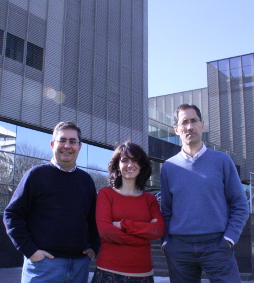CIC nanoGUNE launches Simune, an atomic-scale simulations service for companies
Simune will contribute to solving technological problems saving both, time and costs.The service will be provided by nanoGUNE’s Theory group and will be initially focused towards energy and electronics.
CIC nanoGUNE launches a new service called Simune with the aim of supporting a large variety of companies and institutions in their R+D processes. This service will perform computer simulations in order to study the behavior of matter at the atomic scale. In this way, Simune will help to solve specific technological problems with a lower investment.

The simulations offered by the new service, launched by nanoGUNE together with external scientists, could be useful for many sectors. At first, Simune will be specially targeted to companies working with energy and electronics. Ester Sola, Simulations Services Manager, explains how they will perform “nanometric-scale theoretical simulations of solids, liquids and nanostructures based on the principles of quantum physics and using supercomputers”. “This type of calculations allow us to predict how a specific component will evolve over very long time spans, or to analyze the properties of materials before creating them physically in order to evaluate their suitability”, Sola says. Thereby it is possible, for instance, to advance the evolution of nuclear waste for a longer period of time, to evaluate new mechanisms to reduce CO2 in the atmosphere, or to measure the efficiency of a new material before its production.
The service has been promoted by nanoGUNE, through Emilio Artacho and 3 other expert researchers in computer simulations: Pablo Ordejón (from ICN2-Centre d’Investigació en Nanociència i Nanotecnologia), José María Soler (Universidad Autónoma de Madrid) and Juan José Palacios (Universidad Autónoma de Madrid). The first three (Artacho, Ordejón and Soler) are co-authors of the “SIESTA” code, internationally renowned computational software, and Juan José Palacios is co-author of the “ANT” code
Researchers from nanoGUNE will use these and other codes to resolve the different problems faced by the companies in their R+D actions. Emilio Artacho – Ikerbasque researcher and leader of the Theory group which supplies the service – hopes that “the sum of their expertise, along with nanoGUNE’s equipment, will provide useful solutions to increase companies competitiveness.
Jose Maria Pitarke, Director General at nanoGUNE, considers that “this new service contributes to nanoGUNE’s commitment of developing the competitiveness of the Basque Country as it favors the transfer of technology from our research groups to companies”. Owing to the knowledge and background of the researchers involved in this service, nanoGUNE is now able to offer a support service to the business world. Companies wishing to access further information can visit simune.nanogune.eu Theory before practice
The Theory Group at nanoGUNE, established in October 2011, is formed by group leader Emilio Artacho and seven more researchers, and will continue growing. The group’s computational cluster, owned by nanoGUNE, works in a network connected to other computational nodes. This cluster is used to perform complex computational simulations at the atomic scale. The position of the group and the determination of nanoGUNE, has made it possible to launch Simune on a solid and future-proof basis.
Emilio Artacho states that “in order to develop future applications based on nanotechnology, it is vital to complement experiments with theoretical simulations of the systems of interest at a nanometric scale”. The incredible advance of calculation algorithms, along with the increasing processing power of computational clusters, enables the steady increase of the size and complexity of the systems that can be simulated, allowing scientist to make more and more accurate predictions on how to design a new material, or how nanosystems behave at molecular scale.
The theoretical description and modeling of new nanodevices and the diversity of phenomena occurring at the nanoscale require sophisticated calculation techniques and theoretical approaches commonly used in Condensed Matter Physics and Computational Chemistry. These methods can be, however, extremely useful in a large variety of fields (Physics, Chemistry, Materials Science, Biophysics, Optics, Engineering, Environmental Science, and so on): very diverse disciplines that converge in nanotechnology. “The multidisciplinary approach is fundamental when talking about nanoscience, and it is one of the basis of nanoGUNE’s research strategy”, Artacho asserts.
Once the Theory group has been consolidated and the simulations service launched, the Basque center for nanoscience and nanotechnology continues fulfilling his commitments: opening new research lines within its 9 research groups, working in an interdisciplinary way, and generating new knowledge for contributing to the competitive and social development of the Basque Country.
See the press release in Basque and Spanish here
Ester Sola (Simulation Services Manager): e.sola@nanogune.eu
Itziar Otegui (Outreach manager): i.otegui@nanogune.eu
